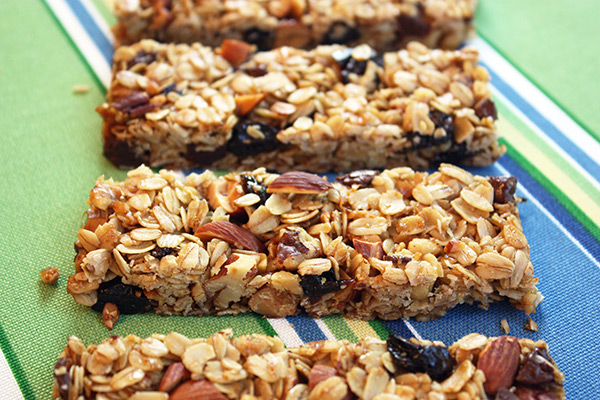Can I consume granola bars daily? Is it healthy to do so?
Let’s explore in this post the reasons why granola bars are considered healthy – and why they are not.

Granola bars – where do I even start? They are a truly versatile food. Imagine this – your favourite breakfast cereal, packed with crunchy nuts, deliciously dried fruits and sweet, sweet honey, all packed in a finger-sized, mess-free bar. This couldn’t get better than this! And, of course, with athletes, bodybuilders, and social media influencers all praising this small, finger-sized bar, it is no surprise that they are increasingly popular among us common folks! These bars are absolutely ubiquitous, from youngsters’ lunchboxes to midday snacks. But are they healthy for you?
Dieticians and nutritionists both agree and disagree that granola bars are healthy. In fact, the debate on whether they are healthy or not is a never-ending one. Before starting to explore if they are truly to be a staple in your diet, let’s first take a look at what is inside a typical granola bar.
What are granola bars made of?
Most granola bars have the same base. A cereal mix that provides the major macronutrients (Carbs, Proteins, Fats and Fibres) with a mix of nuts and dried fruits for the essential micronutrients (Vitamins, minerals and antioxidants). In addition, they also have a binding agent. A few essential food additives are added to increase the shelf life of the product.
Typical granola contains rolled oats. They are rich in complex carbohydrates, proteins and fibres, keeping you sated for a few hours. They are also relatively lower in fats and bad cholesterol and hence favoured. In addition to oats, some granola bars may also contain buckwheat and rice crisps. The latter is mainly added for taste and texture rather than for its actual nutritional value.
The nuts and dried fruits are added to provide sweetness and crunchy texture to the granola bar. It is also responsible for the vitamin, minerals and fat levels of each bar. Our body uses healthy Polyunsaturated Fatty Acids (PUFAs) as reserve energy fuel. Certain fatty acids also act as antioxidants and are actually necessary for our body to decelerate the ageing process.
To make granola bars alluring to picky eaters and junk food enthusiasts, many brands add dark chocolates to their products. Truthfully, chocolates contain a fair amount of healthy antioxidants, and consuming them in limited quantities is linked with decreased heart diseases.
Honey – A natural sweetener in granola bars
Honey is a natural binding agent used in homemade as well as commercial granola bars. They essentially act as glue to keep the bar from crumbling. When combined with oats, the starch, softened by honey, aids in the granola bar’s binding. Some bigger brands use xanthan gum as a binding agent. Honey also has additional benefits, including its antioxidative properties. Its non-perishable nature also helps in preserving the bar, acting as a natural preservative. Honey is also a good antimicrobial agent, thus preventing to an extent the microbial contamination of the granola bar.
Are Granola bars healthy?
Granola bars are, without a doubt, a lifesaver for individuals who exercise, work hard or simply prefer a more nutritious snack alternative. They are small yet surprisingly filling and are a better option compared to greasy junk foods and candy. To claim that they are the healthiest snack, however, would be an overestimation. The latest statistics highlight a disturbing truth. Most commercialized bars have the same number of calories and sugars as candy.
Here’s the thing – granola bars are consumed as a post-workout snack, a meal replacement and as a stamina booster. As a result, it’s a good idea to pick a bar that’s low in sugar, calories, and fats. The right granola bar should contain about 10 grams of proteins 7 – 10 grams of fibres and less than 5 grams of sugars. And yet, the sad truth is that most commercial bars contain lesser amounts of proteins and fibres in comparison to sugars.
Another thing that one should worry about is that granola bars are loaded with food additives like preservatives, colours and flavourings. These additives, though approved by the FDA, FSSAI and HACCP, are not without risks. Most of these additives, when consumed over the long term, are associated with gastrointestinal issues.
The Final Word
This does not necessarily mean that you should ditch your granola bars. It’s important to know that these processed snacks must be taken in moderation. You could also switch to a healthier granola bar. Most new start-ups are health-conscious and are more aware of bringing wholesome products to consumers.
Check out Fodvez for a collection of granola bars.


